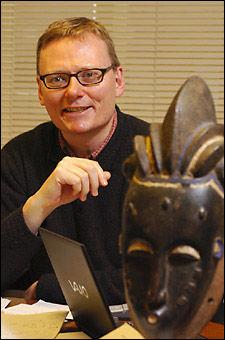Riding a bicycle built for two
Combining rigor of economics with rich empirical data of political science

For James Robinson, recently appointed to a tenured position in the Government Department, the desire to understand the world from a broad intellectual perspective began when he was a boy in England in the 1970s.
“I got interested in economics at the age of about 14,” he said. “In England, the news at that time was all about the money supply and inflation. I wanted to understand what it meant, so I started to teach myself economics.”
As an undergraduate at the London School of Economics, Robinson studied both economics and political science. The problems that political science addressed interested him, but its use of case studies as a methodological approach seemed insubstantial.
“It just seemed like people telling stories, an endless recitation of facts. But, on the other hand, political scientists often have a deep knowledge and understanding of how society works.”
But economics seemed to suffer from another sort of weakness – the possession of a more precise and powerful set of tools but a reluctance to apply them to phenomena that lay outside its rather abstract field of interest.
Robinson initially chose the path of economics, earning a Ph.D. from Yale in 1993 and taking a teaching job at the University of Melbourne in Australia. But after a while he realized that the broader focus that had originally attracted him was not something he was willing to give up.
“I decided that life was too short and that I had better figure out how to introduce the political element into the story, how to combine the things I knew how to do with the things I was interested in.”
Since making that decision, Robinson has focused on the broad issue of international development – why some countries are poor and others rich.
“It’s basically all a matter of politics, which is something that most economists can’t see. There’s a tradition in economics of thinking of politics as a kind of irritation, which is fundamentally misleading as a vision of society. You can’t have a politics-free economics. Of course, political scientists would like to have an economics-free political science, which is not very interesting either.”

Robinson has co-authored a book with Daron Acemoglu, an economist at the Massachusetts Institute of Technology, that attempts to bring together the rigor of economic analysis with the rich empirical data of political science. The authors of “Political Origins of Democracy and Dictatorship” use mathematical models and game theory – methodologies more commonly associated with economics – to address fundamental questions in comparative politics.
The book, which will be published by Cambridge University Press, compares stable democratic governments, like that of the United States, with the more revolution- and dictatorship-prone governments of Latin America. Robinson and Acemoglu argue that democracies often collapse in highly polarized societies in which a pronounced gap exists between rich and poor. When the wealthy control the government, they enact policies that perpetuate their own dominance, but when the poor gain power they tend to put extremely radical programs in place such as land reform or income redistribution, arousing violent resistance on the part of opposition groups.
The United States avoided this problem because there was egalitarian access to land and economic opportunity, and thus less incentive for one group to try to monopolize political power. But in Robinson’s view, the stability of the American government was achieved as the result of a trade-off, rather than through any superior moral qualities.
“The United States solved some of the problems that Latin America faced by disenfranchising African Americans, who had almost no political power in the South until the Voting Rights Act of 1965,” Robinson said.
History and geography have also had a great deal to do with the comparative development of these countries, Robinson added, a point illustrated by the founding of the British Jamestown colony in 1607.
The colony nearly perished in its first year, when 154 of its original 214 settlers died, mostly from starvation. In hindsight, the result seems inevitable, since the colonists scarcely bothered to plant any crops, but in fact they were following a model that had worked spectacularly well for the Spanish conquistadors.
“The first thing you did was capture the Indian chief, and then the Indians do everything for you. But that didn’t work in Virginia because the Algonquin Indians didn’t have a centralized society, and they weren’t interested in helping the Europeans.”
In places like Mexico and Peru, the Spanish conquerors took over complex societies that already had systems of taxation, tribute, and forced labor, and profited from the wealth they extracted. But in the British colonies, where different conditions prevailed, a very different type of society evolved.
“It wasn’t because the British were nice and the Spanish were not nice. Look at India; the British did some terrible things there. It’s rather that there is a persistence to historical patterns. Some people think that’s depressing, but I think it’s just the way the world is.”
Robinson’s next project is a study of historical economic development in South American countries. During a recent sabbatical, he gathered comparative data from Colombia, Argentina, and Peru that show striking differences in wealth, education, infrastructure, and other measures not only from country to country, but within countries as well. These differences, he suspects, will turn out to be historical and political in nature, and understanding them will help social scientists better deal with development issues in general.
“I want to change the way people think about forces that lie behind underdevelopment,” he said.




